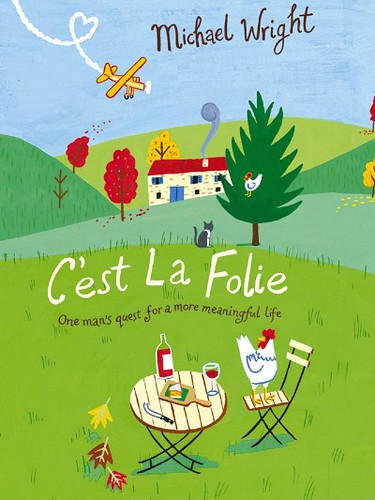C’est La Folie
C’est La Folie sounds like a jovial and bad attempt at calling the world a crazy place. In fact it rather put me off to begin with. Well, crazy place it might be, but for those of you yet to discover the delightful book that bears this title, I am so excited for you to read it. I am willing to vouch for the fact that it will bring (votre) vie française back into the here and now.
English journalist, Michael Wright, tells the story of his move to France. To the Limousin, to be more precise. He takes you through the paces of his move to la douce France, and very vividly shares all the joys and insecurities that come with such a journey. I am embarrassingly bad at reading when I am not away on holiday (usually in France); however, my father gave me this book one Christmas and I earmarked so many pages because I had to share them with people who would recognise how it felt to be in some of the following situations. I suppose you could well call this blog post a ‘spoiler’, but I can assure you it’s not a patch on the real thing.
Here are just a few of those earmarks. Some points forts, if you will…
“Then let’s make an appointment for you.”
“But I only want to move from one branch to another.”
“You still need an appointment.”
“Later today?”
“Tuesdays are busy. Come back on Friday. 11 am.”
Meeting the neighbours (and attempting to master social niceties without sticking out):

Trying to get involved in the community (and being presented with children more aware of local greetings than you are):
‘“Bonsoir, Michael,’ announces Céline as I walk in, and Fabrice the organist comes shuffling up to shake my hand… The little boy I first saw scuttling about in the organ-loft, his mouth no longer caked in chocolate, emerges from behind his father’s legs and presents his face to be kissed.”
Grappling with the language (forget dreaming in French, this is the true mark of progress):
“My French must be improving because the locals have stopped making polite comments about it. Indeed, now that my linguistic manglings are no longer a talking point, I begin to suspect that the phrase I used to hear – Ah, vous parlez bien le français! – really means ‘Your French is charmingly hopeless, but well done for trying.’ Alarmingly, most of les Anglais don’t.”
Accepting you are not French, and yes, the English tourists are (embarrassingly) from the same country as you are. We’ve all been there:
“I take the Espace to the garage at Carrefour… The kiosk is shut, but you can still buy fuel if you have the right kind of card. The smartly dressed English couple in front of me don’t have one. They peer at the screen, puzzling over which button to press to valider their transaction, while the queue lengthens behind them.
‘C’est là,’ I explain, gently pointing out the green button embossed with a ‘V’… Hubby presses it and I lead him, in French, through the next few steps… After a few seconds’ delay, a rejection message flashes up and the card pops out. He’s about to reinsert it when I explain – still in French – that it is the wrong type of card and will not work.
‘Ah, oui, oui’, he nods, pretending to understand, and pointlessly shoving the card back in the machine.”
(Discovering he speaks English (“Oh, thank God”), Michael Wright suggests finding a manned petrol station on a Sunday is nigh-on impossible, and offers to pay with his card in exchange for cash…)
“‘Would you really do that?’ he asks, open-mouthed. ‘That’s incredibly kind. Are you sure?’
But it’s not incredibly kind. ‘C’est normal’, as they say in France, where the kindness of strangers no longer takes me by surprise.”
The book is full of simple delights – every bit as simple and as delightful as the life Michael discovers on the other side of the Channel. The above, in isolation, does not do it justice, but in context takes you back to France, when if you, like me, cannot revisit it half as often as you would like.
You can read more about La Folie here!










Very funny ! Sounds like a great read 🙂 Reminds me a little bit of the novel A Year in the Merde.